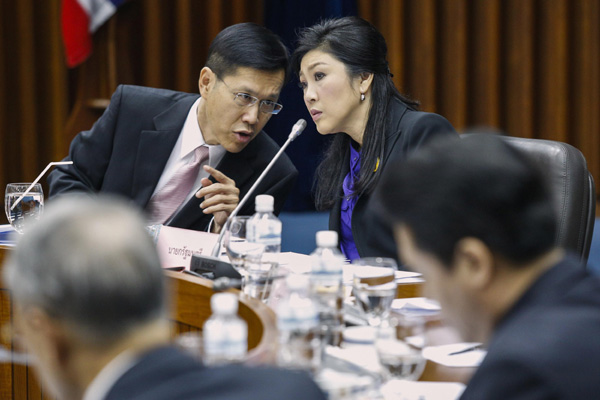 mbattled government offered to sell rice at a huge loss, officials said, as it sought to shore up Prime Minister Yingluck Shinawatra's support among farmers who are concerned that the administration could run out of money to pay them.
mbattled government offered to sell rice at a huge loss, officials said, as it sought to shore up Prime Minister Yingluck Shinawatra's support among farmers who are concerned that the administration could run out of money to pay them.The government, battling a campaign to oust Yingluck that has pitted the royalist, Bangkok establishment against her mainly rural supporters, offered rice at around 30 percent below cost on the export market to continue funding a rice intervention scheme, a Thai and a Philippine official said.
The offers continued until Yingluck dissolved parliament last month to counter the campaign against her government.
Her caretaker government lacks the authority to take major decisions, including the export of state rice stocks, and has to rely on domestic sales to pay the mounting bills it owes rice farmers in Yingluck's provincial strongholds.
The government does not disclose at what prices it offloads rice in the domestic market, but traders estimate they will be substantially below anything offered on the international market.
"We need to adjust ourselves in order to sell rice at appropriate prices to get liquidity to run the rice-buying scheme," said Surasak Riangkrul, director-general of the Foreign Trade Department, which oversees sales of the government's rice stocks.
He declined to disclose the exact price Thailand is offering but another official in the commodity trade department said Bangkok quoted $475 a tonne in a government-to-government deal with Manila last month to supply 500,000 tonnes.
This is almost a third below the estimated cost of 22,000 baht ($669) per tonne the government incurred on buying paddy from farmers, milling and storage. At the time, rice prices in the world market were around $400-$420 a tonne.
A spokesman of the National Food Authority (NFA) in the Philippines said Thailand reduced the offer price further to $462 per tonne as it tried to outbid Vietnam, which quoted $462.25, highlighting Bangkok's desperation.
"But it was too late because we had already decided to award the deal to Vietnam," said Rex Estoperez, NFA's spokesman.
The subsidy, which has cost the government billions of dollars, has fuelled the political crisis that is being played out on the streets of Bangkok.
Protesters are seeking to topple the government, which swept to power in 2011 with support from rural voters, many of them rice farmers who had welcomed the generous intervention scheme. City dwellers are angered that their taxes are paying for the subsidy.
However, hundreds of farmers, some unpaid since October, have also joined the demonstrations against Yingluck, disillusioned by the government's inability to reliably fund the controversial programme.
Farmers who have not been paid by the state for rice bought under the scheme threatened to block roads in 26 provinces last month.
Thailand is sitting on a massive rice stockpile, estimated between 15 and 17 million tonnes.
But in a reprieve for the government, Thailand's state-backed farm bank, which runs the rice scheme, raised 32.58 billion baht ($991.33 million) in a domestic debt issue that was far better subscribed than expected, officials said on Thursday. It had aimed to raise 20 billion baht.
Earlier this week, Thai rice prices slipped as fears of payment disruptions under the rice-buying scheme forced farmers to unload the grain in the market, despite higher prices offered by the government, traders said.
The money raised in the bond issue looks set to be used to pay farmers since rice sales are limited by the ban on exports.
"The caretaker government has no authority to seal any state binding agreements, including rice deals, so government-to-government rice sales will halt automatically," Surasak said.
Thailand sold 1 million tonnes of rice to China in November to be supplied over a period of one year but the shipments have been held up as the Election Commision says the caretaker government cannot enact long-term contracts that would commit any new government, an official of the commission said.
The rice-buying programme made Thai rice more expensive in the global market, and in 2012 the country lost its crown as the world's top exporter, with India taking over.
Anti-Yingluck protesters say the rice scheme is corrupt and has helped wealthy farmers and regional politicians more than the poor.
Protesters brought parts of Bangkok to a near-standstill this week but the government is sticking to a plan for a Feb 2 election as it believes support for the leader of the agitation is waning.
The protesters have rejected the proposal to hold elections and want an unelected "people's council" to take power.
Nevertheless, rival exporters Vietnam and India fear losing market share when Thailand resumes exports with reduced prices.
"Definitely there's a big chance that we will buy more from Thailand if they offer a better price," said Estoperez of the Philippines' NFA, one of the world's biggest buyers of rice. "Whether it is a government-to-government deal or a private transaction, the price and quality are always important for us."





